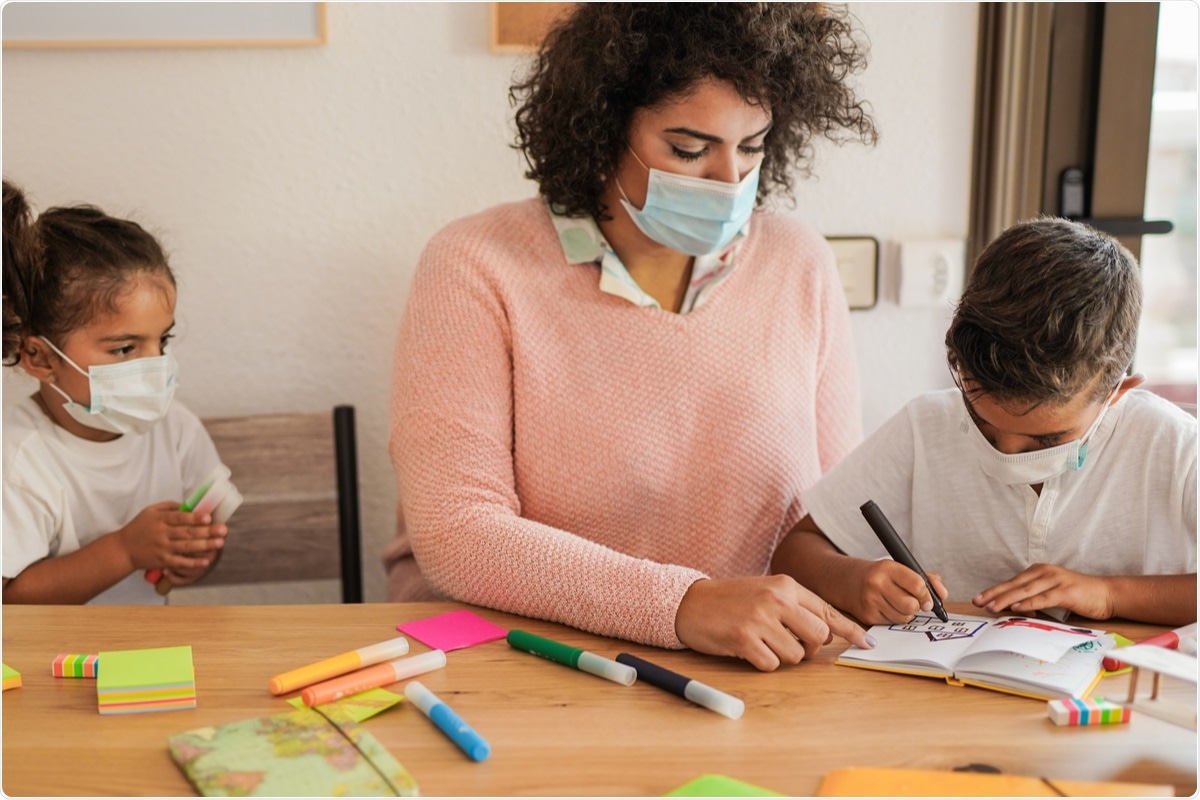Scientists and healthcare officials are working at a record speed to develop vaccines, therapeutics, diagnostics, and other strategies to contain the ongoing coronavirus disease 2019 (COVID-19) pandemic that has been caused by a novel coronavirus, namely, severe respiratory syndrome acute coronavirus-2 (SARS-CoV-2). As this virus is extremely contagious, city-wide lockdowns have been implemented to stop the further spread of the disease.
 Study: In-person schooling and associated COVID-19 risk in the United States over Spring Semester 2021. Image Credit: Sabrina Bracher/ Shutterstock
Study: In-person schooling and associated COVID-19 risk in the United States over Spring Semester 2021. Image Credit: Sabrina Bracher/ Shutterstock
Background
The role of children in COVID-19 transmission and in-person schooling has been a contentious issue. In the US, policies regarding in-person schooling have varied drastically with a heterogeneous mix of in-person and remote schooling. Over the 2020-21 spring semesters, many schools in the US initiated in-person schooling after the winter wave of the pandemic receded. The resurgence of the COVID-19 infection owing to the circulation of the Delta variant in the fall indicated SARS-CoV-2 to be a continuous threat worldwide. However, due to increased vaccination and a broad consensus on the benefits of in-person schooling, most schools continued in-person classes despite the new increase in the COVID-19 cases.
One of the challenges in gauging the risk of in-person schooling has been limited information on the degree to which children can transmit COVID-19 infection. Generally, children, if infected, show asymptomatic or mild infection. To address this issue, previously, scientists analyzed data collected by the nationwide US COVID-19 Trends and Impact Survey (US CTIS) between November 24, 2020, and February 10, 2021. The Delphi Group conducted this survey in collaboration with Facebook. The main questions addressed in this survey are on demographics, symptoms related to SARS-CoV-2 infection, positive SARS-CoV-2 test results, and remote schooling for children in the household.
This study has been expanded to the entire spring semester (June), i.e., additional four months with respect to the previous study. This study is available on the medRxiv* preprint server. The main objective was to determine the rates of in-person schooling and understand the school-based mitigation measures that were modified over the semester. The study also evaluated if the increased vaccination rate and the emergence of SARS-CoV-2 variants modified the impact on households. Researchers were also inclined to identify other ways by which in-person schooling could increase the risk of COVID-19 among the household members.
About the study
The authors revealed that individuals in contact with a child attending in-person schooling were significantly at a higher risk of developing COVID-19-related outcomes. However, the risks decreased when schools followed strict COVID-19 protocols or mitigation measures. These findings were in line with previous studies. This study highlights the importance of varied mitigation measures to decrease the risk of transmission in schools.
This study was conducted during the 2021 spring semester, and in this period, the rate of vaccination was significantly higher. Scientists pointed out that there was a rise in the SARS-CoV-2 Alpha variant cases at the time of the survey, which was later replaced by the Delta variant in the US. Researchers estimated that the percentage of adults who received at least one dose of COVID-19 vaccine in the US during the spring semester increased from about 7% at the end of January to 53% by mid-June.
The current study reported that changes in in-person schooling and mitigation measures varied between states and counties due to heterogeneity in risk. Researchers found that unvaccinated individuals and living with a student engaging in in-person schooling were at the highest risk of infection compared to vaccinated individuals. However, individuals who were fully vaccinated and living with a child engaged in in-person schooling were at a higher risk of contracting COVID-19 infection than individuals residing in households without children attending in-person school.
This result shows that even though COVID-19 vaccination substantially reduces the overall risk of infection from living with a child in in-person schooling, individuals are still prone to be infected. Concerning teachers, this study found that vaccinated K-12 teachers working outside the home showed limited COVID-19-related outcomes compared to unvaccinated teachers. This finding highlights the importance of vaccination for teachers so that they can safely teach in classrooms. The current study also showed that the use of facemasks prevented the spread of respiratory infections.
Conclusion
One of the study's limitations was that during the study period, SARS-CoV-2's Alpha variant was dominant; therefore, the impact of other variants on children and the efficacy of the vaccines remained unknown. Another limitation is that the data about the risk estimates were self-reported and, therefore, subject to recall bias. However, the overall findings of the current study support previous studies that revealed a high possibility of secondary transmission and outbreaks associated with in-person schooling and child care. Extensive evidence has shown that implementing robust mitigation measures in schools could prevent further transmission of the disease.
*Important notice
medRxiv publishes preliminary scientific reports that are not peer-reviewed and, therefore, should not be regarded as conclusive, guide clinical practice/health-related behavior, or treated as established information.
- Wiens, K. et al. (2021) "In-person schooling and associated COVID-19 risk in the United States over Spring Semester 2021". medRxiv. doi: 10.1101/2021.10.20.21265293.
Posted in: Medical Science News | Medical Research News | Disease/Infection News
Tags: Child Care, Children, Coronavirus, Coronavirus Disease COVID-19, Diagnostics, Efficacy, Healthcare, Pandemic, Respiratory, SARS, SARS-CoV-2, Syndrome, Therapeutics, Vaccine, Virus

Written by
Dr. Priyom Bose
Priyom holds a Ph.D. in Plant Biology and Biotechnology from the University of Madras, India. She is an active researcher and an experienced science writer. Priyom has also co-authored several original research articles that have been published in reputed peer-reviewed journals. She is also an avid reader and an amateur photographer.
Source: Read Full Article
